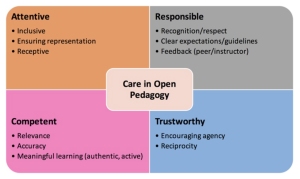6 Benefits of Open Pedagogy
Now you know that Open Pedagogy:
- centers the student experience
- embraces students creating content
- creates a transparent and inclusive learning environment.
Let’s explore how these principles create some pretty amazing benefits for students.
Centering Care
Right now you might be thinking, “Okay, I’m expected to not only learn new information in this class, but also create and contribute to the learning? That’s a lot!” And you would be right! Open pedagogy has a lot of benefits, but it also expects a lot of you. This prospect might seem a bit frightening, a bit frustrating, a bit exciting, or all three!
A major benefit of engaging in open pedagogy is that your instructor is taking all of these different feelings into account and creating a learning environment that centers care, empathy, and flexibility. A recent article found that, “according to students…the processes of OP [open pedagogy] encourage students and teachers to be attentive, responsible, competent, and trust-building”.[1]
Here’s a visual representation and breakdown of how students experience care in open pedagogy:

Part of open pedagogy involves centering care, so navigating these new experiences can lead to your own empowerment and growth.
Student Agency
Another benefit of engaging in open pedagogy is the you’ll have over your work in so many different ways. Open pedagogy centers your agency so you can make decisions about how you might express your intellectual property rights (something we’ll talk more about in Chapter Six), or the submission format for a project, or how you choose to participate in certain activities.
When you authentically engage in open pedagogy work, each step of the process is transparent, flexible, and builds in opportunities for choice. As your instructor is laying the foundation for working in the open, ideally, each part of the class will be so that you are consistently learning new skills and then building on those skills.
Take a look at this visualization which lays out a process for how your instructor might build your class. You can click on the purple plus signs for more information about each step.
“Scaffolding Roadmap for Open Pedagogy Assignments” by Amanda C. Larson licensed under a Creative Commons Attribution 4.0 International License.
This process of scaffolding skills will keep you from feeling overwhelmed as you learn to work in the open and have a brand new learning experience.
Exploring Digital Tools
In the “Scaffolded Experiences are Integral” graphic above, you’ll see stop 3: Tool Training. Open pedagogy projects and renewable assignments go hand in hand with digital learning tools. This is because a lot of different tools offer students the opportunity to easily create, collaborate, and share their work with their class and potentially a more public audience. Getting to learn new technology and tools is a huge benefit to working in the open because technology is never going to stop evolving and innovating.
Even out in the workforce or in daily life, technology plays a big role in how we go about accomplishing our goals. Being familiar with the basic architecture of digital tools can help build a foundation for using other types of technology in your future.
One tool/technology that is becoming increasingly popular is Artificial Intelligence (AI). AI tools like ChatGPT, Bard, Dall-E, and others have added a whole new layer of possibilities when it comes to working with digital tools. The use of AI will continue to grow, so understanding how to use it effectively and ethically adds to your skillset as a technology user and consumer.
Engagement and Critical Thinking
Although the research on open pedagogy is still growing, preliminary research shows that engaging in open pedagogy can positively impact students. Students have reported increased engagement and motivation when engaging in renewable assignments and other forms of open pedagogy.[2] This makes sense, right? When you have more say in your educational experience and how you complete a project, you take more pride and find more enjoyment in your work.
Let’s also think about the type of work you’re doing; when you’re creating content, you have to really understand what you’re talking about. Open pedagogy creates opportunities for deeper learning because you are engaging in a dynamic learning process where critical thinking is essential. In one study, students reported that open pedagogy made them really understand and synthesize the material better than a traditional quiz or test and that the cognitive rigor was much higher than they have experienced in classes without open pedagogy assignments.[3]
All of these benefits work in concert to reinforce the goals of open pedagogy: empowering students as learners and creators and building engaging and inclusive learning experiences for all.
- Maultsaid, D. and Harrison M. (2023). “Can open pedagogy encourage care? Student perspectives”. International Review of Research in Open and Distributed Learning, 24(3), 77-98. https://doi.org/10.19173/irrodl.v24i3.6901. Licensed under a CC BY 4.0 License. ↵
- Clinton-Lisell, V. and Gwozdz, L. (2023). “Understanding student experiences of renewable and traditional assignments”. College Teaching, 71(2), 125-134. https://doi.org/10.1080/87567555.2023.2179591. Licensed under a CC BY NC 4.0 License. ↵
- Hilton III, J., Wiley, D., Chaffee, R., Darrow, J., Guilmett, J., Harper, S., & Hilton, B. (2019). Student perceptions of open pedagogy: An exploratory study. Open Praxis, 11(3), 275-288. DOI: https://doi.org/10.5944/openpraxis.11.3.973 ↵
![]()
Benefits of Open Pedagogy from The Open Pedagogy Student Toolkit Copyright © 2023 by The Open Education Network is licensed under a Creative Commons Attribution 4.0 International License, except where otherwise noted.

